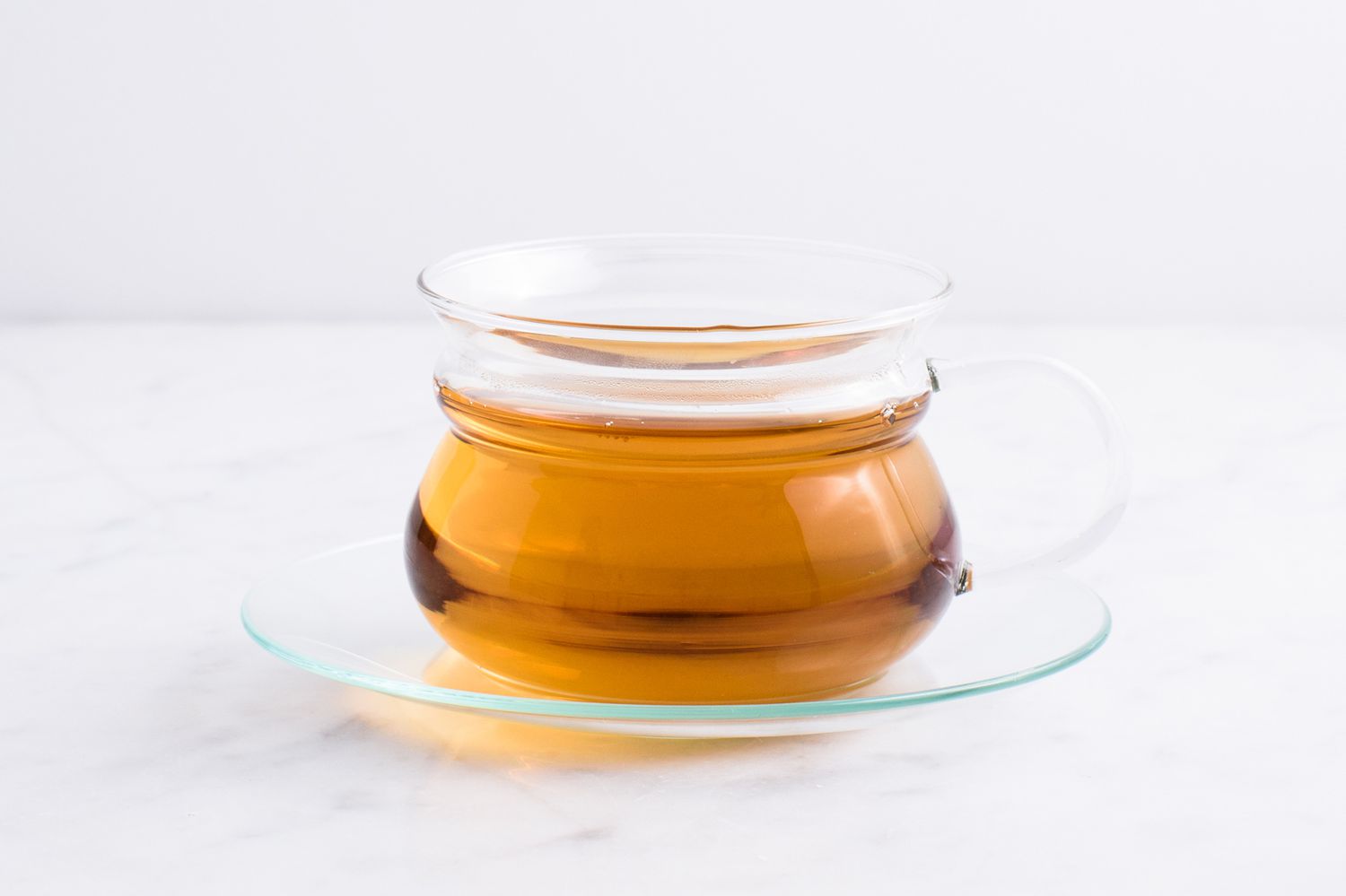Comfrey Tea Benefits and Side Effects
Is Comfrey Root Safe or Healthy?

Verywell / Alexandra Shytsman
Comfrey tea is an herbal tea with a long history of use. However, comfrey leaf and comfrey root products have raised concerns with health agencies because comfrey contains chemicals called pyrrolizidine alkaloids (PAs) that may be harmful. For this reason, it is smart to be cautious when drinking comfrey tea or using other comfrey products.
What Is Comfrey Tea?
Comfrey tea is made using the leaves of the Symphytum officinale or common comfrey plant. The perennial plant is native to Europe but also grows widely grown in western Asia, North America and Australia. The comfrey plant has a black, turnip-like root and leaves are often described as hairy, prickly, and broad. The plant also bears small purple or cream flowers.
Comfrey is also known as ass ear, black root, blackwort, bruisewort, salsify, slippery root, or wallwort.
Comfrey tea has a long history of use as a treatment for aches and pains. Traditionally called knitbone or boneset, the tea was reportedly used by ancient Greeks and Romans to heal injuries after a bad fall or accident. However, in recent years, because of safety concerns, most consumers only use comfrey externally.
While you can make comfrey tea at home, health experts do not advise that you drink the tea. For that reason, some fans of the herbal treatment make comfrey tea, allow it to cool, and apply it topically to the skin or to areas of the body where aches and pains are present.
Comfrey Tea Health Benefits
Comfrey root and comfrey leaf benefits are widely promoted because of the herb's long history of use. These rumored benefits include:
- wound healing
- relief from excessive menstrual flow
- scar reduction
- burn relief
- treatment of bronchitis
- treatment for rheumatoid arthritis
- treatment for rashes or insect bites
- treatment of broken bones, sprains, strains
- relief from general aches and pains
- improved dental health (stronger teeth)
- better blood circulation
- smoother skin
- acne treatment
- cancer prevention
It is not clear whether comfrey can actually provide these benefits. No strong scientific evidence has confirmed these benefits in humans. According to Memorial Sloan Kettering Cancer Center (MSKCC), comfrey root and comfrey leaves contain powerful substances that can impact your health. These include allantoin, rosmarinic acid, and pyrrolizidine alkaloids according to published studies.
The Therapeutic Research Center Natural Medicine Database reports that comfrey applied topically may be effective for treating back pain, osteoarthritis, or sprains. However, MSKCC along with other well-respected health agencies, advise against using comfrey due to serious health concerns.
Comfrey Tea Risks and Side Effects
The Natural Medicine Database suggests that comfrey is possibly safe for most people when applied to unbroken skin in small amounts for less than 10 days. But they add that comfrey is likely unsafe when taken by mouth or when it is applied to broken skin. They also advise pregnant or breastfeeding women to avoid using it topically or by mouth.
In 2001, the U.S. Food and Drug Administration (FDA) advised supplement manufacturers to remove products containing comfrey from the market. In reports filed with the Poisonous Plant Database, the agency stated that "regular use of comfrey as part of the diet or for medicinal purposes may be a potential health risk as a result of the presence of naturally-occurring pyrrolizidine alkaloids."
More specifically, comfrey contains compounds that are toxic to the liver and may cause liver damage and/or cancer.
A Word From Verywell
If you've experienced a fall, a broken bone, or are suffering from muscle aches and pains, you may be tempted to take advantage of comfrey benefits. There is a possibility that using comfrey on your skin may provide some relief, but there is also a possibility that it will provide no relief at all and it may cause harm.
For those reasons, it may be smarter to work with your healthcare provider to come up with a safer solution. There are many treatments for back pain and muscle aches that are backed by scientific studies and have fewer side effects.
European Medicines Agency. Assessment report on Symphytum officinale L., radix. Committee on Herbal Medicinal Products (HMPC).
Oberlies NH, Kim NC, Brine DR, et al. Analysis of herbal teas made from the leaves of comfrey (Symphytum officinale): reduction of N-oxides results in order of magnitude increases in the measurable concentration of pyrrolizidine alkaloids. Public Health Nutr. 2004;7(7):919-24.
Comfrey. Drugs and Lactation Database LactMed. National Library of Medicine (US) May 17, 2021
Memorial Sloan Kettering Cancer Center. Comfrey.
Therapeutic Research Center. Natural Medicines Database. Comfrey.
- Comfrey. Memorial Sloan Kettering Cancer Center. Integrative Medicine. About Herbs & Other Products. https://www.mskcc.org/cancer-care/integrative-medicine/herbs/comfrey
- Comfrey. Michigan Medicine. University of Michigan https://www.uofmhealth.org/health-library/d04502a1
- Comfrey. Penn State Hershey. Milton Hershey Medical Center. http://pennstatehershey.adam.com/content.aspx?productId=107&pid=33&gid=000234
- Comfrey. Therapeutic Research Center. Natural Medicines Database. https://naturalmedicines.therapeuticresearch.com/databases/food,-herbs-supplements/professional.aspx?productid=295
- Staiger, Christiane. Comfrey: A Clinical Overview. Phytoptherapy Research. February 2012. https://doi.org/10.1002/ptr.4612
:max_bytes(150000):strip_icc()/Malia-Frey_1000-2f7768d8777a4ebbac39d628bc31b714.jpg)
:max_bytes(150000):strip_icc()/Marisa-Moore-1000-c2eb7b8f29ea4fc58b95fa1616b0b599.jpeg)
:max_bytes(150000):strip_icc()/Malia-Frey_1000-2f7768d8777a4ebbac39d628bc31b714.jpg)
:max_bytes(150000):strip_icc()/soursop-tea-crop-52ccccae4c4b4d39b1e8e274a7e9d9e9.jpg)
:max_bytes(150000):strip_icc()/VW-Fit-The-13-Best-Pain-Relief-Creams-of-2021-4160640-final-c16edc2debf5420797746bce9326509a.jpg)
:max_bytes(150000):strip_icc()/eucalyptus-crop-fa3e4368724148c4849579811cf8e04a.jpg)
:max_bytes(150000):strip_icc()/burdock-tea-crop-6ac8598eec134f40b5906df9dce8d9fb.jpg)
:max_bytes(150000):strip_icc()/parsley_crop-45ea8d9db1a24f82aba1a605db753bbf.jpg)
:max_bytes(150000):strip_icc()/mint-tea-crop-bddab4528eaa43cd98d595b2daefdde2.jpg)
:max_bytes(150000):strip_icc()/GettyImages-200478629-001-579894cb3df78ceb8636cccf.jpg)
:max_bytes(150000):strip_icc()/sassafras-tea-jpg-e31b5f49a5704662801ba25fedf2fc36.jpg)
:max_bytes(150000):strip_icc()/ginger-tea-crop-9f7de32f65ad415ba2758375ffb0ed44.jpg)
:max_bytes(150000):strip_icc()/GettyImages-1471979246-0638519142bd4a9aa3af64af45750889.jpeg)
:max_bytes(150000):strip_icc()/garlic-tea-crop-dbc6c508fab34177844b91822a79617c.jpg)
:max_bytes(150000):strip_icc()/stevia-ded2e71acd934ae58a946c2deaa2faa0.jpg)
:max_bytes(150000):strip_icc()/green-tea-crop-6cfd8a91bd3641e4ad228f0aa4fcf4db.jpg)
:max_bytes(150000):strip_icc()/body-wrap-LS014540-57f918215f9b586c3576799e.jpg)
:max_bytes(150000):strip_icc()/VW-Fit-v1-The-7-Best-Turmeric-Supplements-of-2021-According-to-a-Dietitian-4687066copy-0dbdfd8005a94b74b949d3be12919f78.jpg)
:max_bytes(150000):strip_icc()/GettyImages-98967346-5b74656246e0fb002c398822.jpg)